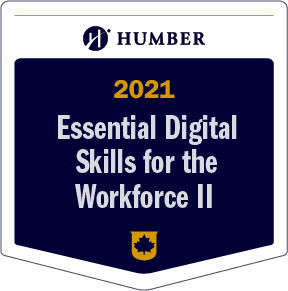
Essential Digital Skills for the Workforce II
Alignments
eCampusOntario Micro-certification Principles and Framework
This framework was developed by a community working group of employers, colleges, universities and other public agencies dedicated to building a harmonized micro-certification ecosystem in Ontario.
Employment and Social Development Canada - Essential Skills Profiles
Essential skills profiles describe how workers in an occupation use each of the nine essential skills: reading, document use, writing, numeracy, oral communication, thinking, digital technology (originally, computer use), working with others and continuous learning.
These nine essential skills are seen as "building blocks" because people build on them to learn all other skills. They are needed for work, learning and life, and allow people to grow with their jobs and adapt to changes in the workplace. The essential skills profiles describe the skills workers need, as well as the level of difficulty required to perform their jobs successfully.
Humber Learning Outcomes Framework
The disrupted nature of work is putting increased pressure on the knowledge and skillsets needed for success in the workplace.
Humber is addressing these challenges by reimagining our future. Supported by an ambitious learning outcomes framework that highlights key mindsets and skills, the Humber experience deeply engages students in their learning and empowers them to think critically, make bold choices and become career-ready citizens.
Criteria
Learning Time: 12-15 Hours
Learning Level: Intermediate
Learning Outcomes:
- Manage digital data reliably using a variety of techniques and appropriate digital tools.
- Search for reliable and credible data using a variety of methods and digital tools.
- Communicate clearly within different professional contexts and digital tools.
- Maintain a professional profile on multiple digital platforms.
- Articulate a personal data protection strategy on various digital platforms.
- Present data accurately using a visual (image, infographic, etc.) created with a digital tool.
- Create and share multiple text-based documents in a secure and professional manner.
- Facilitate an online conversation using at least two digital tools.
- Collaborate with a peer on a cloud-based platform.
**Assessment: ** Earners create and present a Digital Portfolio Level 2 to peers and facilitator:
- Self-assessment of competencies and learning outcomes
- Reflection tasks on development of digital skills
- Action Plan: Goals and actions to develop digital skills
- Include artifacts to demonstrate growth in 5+competency areas